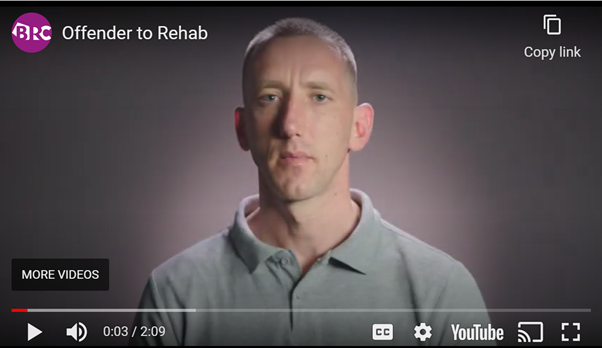
What is Being Done to Tackle Prolific Offending
Organisations are approaching the inter-related issues of prolific offending and substance abuse by providing support to those involved, through rehabilitation projects and working with partner agencies.
Rehabilitation courses have proven to be successful in permanently changing behaviours
Offender to Rehab Programme:
PC Stuart Toogood in West Midlands Police has been a police officer for 25 years and regularly saw the same individuals committing crime in shops with drugs, alcohol or other substances the primary cause for their behaviour.
PC Toogood saw that while custodial sentences stopped the behaviour and kept shopworkers safe for a period, the offenders resumed their habit on leaving prison which meant they began again to target shops impacting the shopworkers in them.
The Offender to Rehab programme that PC Toogood has developed is proven to permanently prevent violence and abuse towards shopworkers by resolving the underlying addiction issues.
Caroline and Jamie’s stories:
Jamie and Caroline have spent over 20 years each in heroin/crack cocaine addiction and both have been to prison numerous times. Both committed crimes to fund their addictions - predominately retail theft. Both would use at least £1,000 a week on drugs and would have stolen around £3,000 from retailers to fund this.
Jamie and Caroline were unable to control their addiction in the community as it was too severe. The usual drug and alcohol support services available were not effective for them.
The Offender to Rehab programme helped these individuals who have now attended rehab and seen amazing results.
Jamie is 12 months into recovery and starting as a trainee support worker at Livingstone House Rehab. Caroline is now 3 years into her recovery and also works as a support worker at Livingstone House.
Unfortunately, this programme will not work for everyone. However, both Jamie and Caroline are clear examples of how rehabilitation treatment can work.
Watch Caroline and Jamie's stories
Many of these schemes have been supported through additional funding from retailers
For example, PC Toogood’s Offender to Rehab programme has been supported throughout by a range of local retailers who recognised that aside from helping those in need, supporting the programme would ultimately stop the abuse and violence their colleagues face.
Project ADDER:
Through Project ADDER (Addiction, Diversion, Disruption, Enforcement and Recovery) we are trail-blazing a whole-system response to combatting drug misuse. We have already committed to date a total of £59m investment for Project ADDER (from 20/21 – 22/23) and through the Government drug strategy entitled ‘Hope over Harm’ published on 6 December, we have committed to extending Project ADDER for two more years until 2025.
The programme focuses on coordinated law enforcement activity, alongside expanded diversionary programmes (such as Out of Court Disposal Orders) and treatment/recovery provisions, including housing and employment support.
The first ADDER locations were launched in January 2021 in some of the areas hardest hit in England and Wales. These are Blackpool, Hastings, Middlesbrough, Norwich and Swansea Bay. Building on this approach, the Government announced an expansion of the programme in July 2021, to include Bristol, Newcastle, Wakefield, two London Boroughs (Tower Hamlets and Hackney) and three local authorities in Liverpool City Region (Liverpool City, Knowsley, Wirral).
The local projects are complemented by Home Office and National Crime Agency activity to tackle middle market drugs supply through the establishment of a new NCA/Merseyside Police Organised Crime Partnership and a Near Europe Taskforce working to disrupt drug supply from near Europe.
As a joint Home Office, Department for Health and Social Care (DHSC) and Office for Health Improvement and Disparities (OHID) Project ADDER is a pathfinder programme, underpinned by a robust monitoring and evaluation framework, including an independent evaluation by Kantar Public, building the evidence base to inform optimal national delivery.
Over the lifespan of the programme, we aim to reduce drug-related death, drug-related offending, prevalence of drug use in each of the project sites and major disruption of high-harm criminals and networks involved in the middle market drug/firearms supply.

